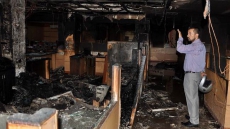TORONTO — Survivors of Canada's notorious residential school system have the right to see their stories archived if they wish, but their accounts must otherwise be destroyed in 15 years, Ontario's top court ruled in a split decision Monday.
At issue are documents related to compensation claims made by as many as 30,000 survivors of Indian residential schools — many heart-rending accounts of sexual, physical and psychological abuse.
Compensation claimants never surrendered control of their stories, the Appeal Court said.
"Residential school survivors are free to disclose their own experiences, despite any claims that others may make with respect to confidentiality and privacy," the court said.
The decision came in response to various appeals and cross-appeals of a ruling by Superior Court Justice Paul Perell in 2014 related to claims made under the confidential independent assessment process — or IAP — set up as part of an agreement that settled a class action against the government.
The federal government and Truth and Reconciliation Commission fought destruction of the documents, saying they should be kept — with appropriate safeguards — to preserve the historical record of residential schools. Catholic parties argued for their destruction.
"This is a once-and-for-all determination of the rights of all parties relating to these issues," the court said. "There will be no future cases like this one."

Writing for the Appeal Court majority, Chief Justice George Strathy decided Perell was reasonable to order the records kept for 15 years and then destroyed, unless claimants chose to have their own accounts archived.
Survivors who opted for confidentiality should not face a risk that their stories would be stored against their will in a government archive and possibly disclosed at some time, even far into the future, the Appeal Court said.
The court rejected the idea the documents were "government records" but said the material fell under the court's control.
"It is critical to understand that the (independent assessment process) was not a federal government program," the Appeal Court said.
"Although Canada's administrative infrastructure was required to carry out the settlement, it was vital to ensure that the court, not Canada, was in control of the process."
The Appeal Court did part ways with Perell on who should be responsible for a notice program that would allow claimants time to decide whether they wanted their records archived or destroyed. Perell had given the task to the Truth and Reconciliation Commission and National Centre for Truth and Reconciliation.
Strathy called that unreasonable. Instead, the court ruled, the notice program should fall to the chief adjudicator of the claims process.
In a dissenting opinion, Justice Robert Sharpe said the claims documents Canada has in its possession are indeed "government records" that should not be destroyed but turned over to Library and Archives Canada subject to normal privacy safeguards and rules.
The process was an "important moment in Canadian history when all Canadians, aboriginal and non-aboriginal, confronted the shocking treatment of generations of aboriginal children in the residential school system and searched for ways to repair the damage," Sharpe said.
"If the IAP documents are destroyed, we obliterate an important part of our effort to deal with a very dark moment in our history."

About 150,000 First Nations, Inuit and Metis children were forced to attend the church-run residential schools over much of the last century as part of government efforts to "take the Indian out of the child." Many suffered horrific abuse.
Material collected by the truth commission, which also heard from thousands of survivors, are being housed at the National Research Centre at the University of Manitoba.


